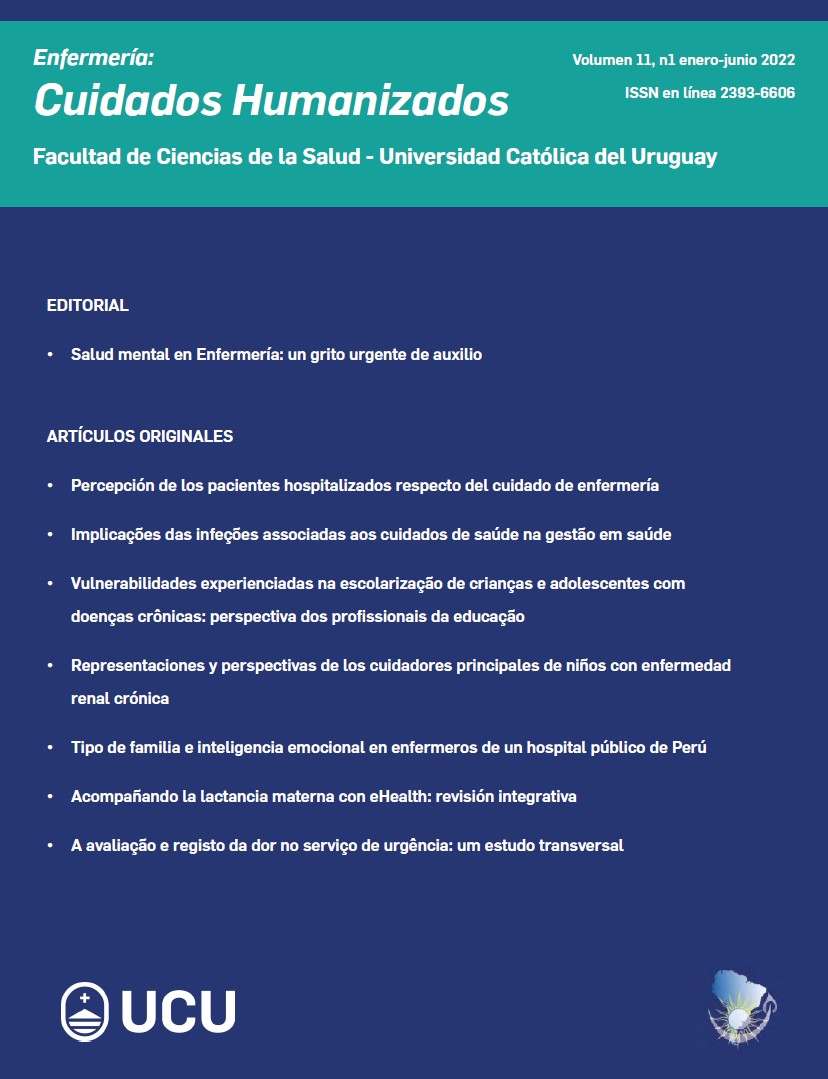Family Type and Emotional Intelligence in Nurses of a Public Hospital in Peru
DOI:
https://doi.org/10.22235/ech.v11i1.2418Keywords:
family, emotional intelligence, nursingAbstract
Introduction: The family, the oldest of human social institutions, marks the individual in his or her different stages of life and constitutes an environment favorable for the improvement of his or her identity. Objective: To determine the type of family and emotional intelligence (EI) in nurses of a public hospital in Peru during pandemic care. Method: The study is a cross-sectional study with a census sample of 80 nurses who worked in COVID-19 hospitalization of a public hospital during the month of May 2020 and who had at least 3 months of seniority. After informed consent, a survey was administered with the Trait Meta-Mood Scale (TMMS-24) in its version adapted and validated to the Peruvian context. Its reliability reached a Cronbach's alpha coefficient greater than 0.8. Results: The predominant type of family among nurses is nuclear (56.3 %) and EI is predominantly low (36.3 %); the low level of the emotional perception dimension (43.8 %) stands out, while the dimensions of understanding and regulation of emotions present a predominance of excellent (36.3 %) and adequate (41.3 %) levels, respectively. Conclusions: EI should be considered when designing health policies for human talent management and when training in health services.
Downloads
References
Sharma R. The Family and Family Structure Classification Redefined for the Current Times. J Family Med Prim Care. 2013 Oct-Dic;2(4):306-310.
Cuba M, Jurado A, Romero Z, Cuba M. Características familiares asociadas a la percepción de la calidad de en pobladores de un área urbano-marginal en el distrito de Los Olivos, Lima. Revista Médica Herediana. 2013 Dic;24:12-16.
Mazo Y, Mejía L, Muñoz Y. Calidad de vida: la familia como una posibilidad transformadora. Revista Poiésis. 2019 Ene;36:98-110.
Vargas H. Tipo de familia y ansiedad y depresión. Revista Médica Herediana. 2014 Dic;25:57-59.
Rodriguez J. Conexión Esan. [Internet]. 2019 [citado 11 Nov 2020]. Disponible en: https://www.esan.edu.pe/conexion/actualidad/2019/12/12/salud-mental-productividad-laboral-y-rentabilidad/
Akerjordet K, Severinsson E. Emotional intelligence: a review of the literature with specific focus on empirical and epistemological perspectives. Journal of Clinical Nursing. 2007 Ago;16(8):1405-1416.
Mahmut A, Işik O. Effects of health employees on motivations of emotional intelligence levels. Dumlupınar Üniversitesi Sosyal Bilimler Dergisi. 2015;32:6-20.
Inga L. Emotional Intelligence Among Surgical Nurses in Latvia. Procedia - Social and Behavioral Sciences. 2011 Dec;30:1908-1912.
Codier E, Molina B, Shoultz J. Measuring the emotional intelligence of clinical staff nurses: an approach for improving the clinical care environment. Nursing Administration Quarterly. 2008 Ene;32(1):8-14.
Fernandez P, Extremera N, Ramos N. Validity and reliability of the Spanish modified version of the Trait Meta-Mood Scale. Psychological Reports. 2004 Jun;94(3):751-755.
Espinoza-Venegas M, Sanhueza-Alvarado O, Ramírez-Elizondo N, Sáez-Carrillo K. Validación de constructo y confiabilidad de la escala de inteligencia emocional en estudiantes de enfermería. Revista Latino-Americana de Enfermagem. 2015 Ene-Feb;23(1):139-147.
Chang M, Mey R. Relación entre inteligencia emocional y respuesta al estrés en pacientes ambulatorios del servicio de psicología de una clínica de Lima Metropolitana [Tesis de grado]. Lima: Universidad Peruana Cayetano Heredia; 2017. Disponible en: https://repositorio.upch.edu.pe/handle/20.500.12866/818
Raghubir AE. Emotional intelligence in professional nursing practice: A concept review using Rodgers's evolutionary analysis approach. International Journal of Nursing Sciences. 2018 Abr;5(2):126-130.
Restubog SL, Ocampo AC, Wang L. Taking control amidst the chaos: Emotion regulation during the COVID-19 pandemic. Journal of Vocational Behavior. 2020 Jun;119:103440. DOI: 10.1016/j.jvb.2020.103440
Nightingale S, Spiby H, Sheen K, Slade P. The impact of emotional intelligence in health care professionals on caring behaviour towards patients in clinical and long-term care settings: Findings from an integrative review. International Journal of Nursing Studies. 2018 Abr;80:106-117.
Sarabia C, Gonzales S, Menéndez E, Sarabia B, Pérez V, Pablo L, et al. Emotional intelligence and coping styles: An intervention in geriatric nurses. Applied Nursing Research. 2017 Jun;35:94-98.
Raghubir AE. Emotional intelligence in professional nursing practice: A concept review using Rodgers's evolutionary analysis approach. International Journal of Nursing Sciences. 2018 Abr;5(2):126-130.
Symeou M, Evstathiou A, Charalambous G, Jelastopulu E. The impact of emotional intelligence on the emotional state of nurses in public hospitals in Cyprus. European Psychiatry. 2017 Abr;41(52):1-5.
Alshammari F, Pasay-an E, Gonzales F, Torres S. Emotional intelligence and authentic leadership among Saudi nursing leaders in the Kingdom of Saudi Arabia. Journal of Professional Nursing. 2020 Nov; 36(6):503-509.
Downloads
Published
How to Cite
Issue
Section
License
Copyright (c) 2022 Enfermería: Cuidados Humanizados

This work is licensed under a Creative Commons Attribution 4.0 International License.

















